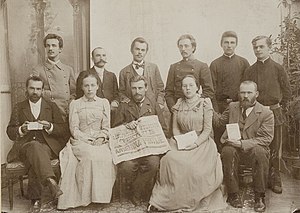Liudas Vaineikis
Liudas Vaineikis | |
|---|---|
| Born | 31 August 1869 Moscow University |
| Occupation(s) | Physician, activist, book smuggler |
| Spouse | Stasė Vaineikienė |
| Awards | Order of the Lithuanian Grand Duke Gediminas (1928) |
Liudas Vaineikis (31 August 1869 – 17 January 1938) was a physician and notable member of the
Already as a student at
During the
Biography
Early life and education
Vaineikis was born on 31 August 1869 in
Vaineikis continued his studies at the Medical Faculty of
Activist

In 1897, he was allowed to move to
In April 1900, Tsarist police seized four bundles of illegal publications: three with Russian social democratic texts and one with Lithuanian publications. Further investigation revealed that this cargo was organized by Vaineikis.
Vaineikis was exiled to the
Later life
He worked as a doctor in Central Asia (
Due to political disagreements with the regime of President Antanas Smetona, Vaineikis was forced to leave Palanga for Alsėdžiai.[8] After his return to Palanga, he became the city's official physician. Vaineikis and his wife were elected to the first city council in December 1932. Vaineikis was selected as a deputy of mayor Jonas Šliūpas, but was not officially confirmed[15] (ostensibly due his "old" age of 64).[2]
For his contributions to the Lithuanian National Revival, Vaineikis was awarded the Order of the Lithuanian Grand Duke Gediminas (3rd degree) in 1928[5] and given a state pension of 380 litas.[2]
Vaineikis died from a heart ailment on 17 January 1938 at the Jonas Basanavičius Military Hospital in Kaunas.[1] He was cremated and, with the help of General Vladas Nagevičius, the urn with his ashes was added to a wall in the Vytautas the Great War Museum. It was removed during World War II and is now kept at the Anatomy Museum of the Lithuanian University of Health Sciences.[8]
Legacy
Vaineikis house in Palanga was demolished in 1973.[8] At this location, a bust of Vaineikis by architect Rūsna Vaineikytė (Vaineikis' granddaughter) and sculptor Jonas Jagėla was erected in 1989.[16]
Personal life
In 1900,
References
- ^ a b c Tsb (16 February 1938). "Dr. Liudas Vaineikis – didysis lietuvių spaudos draudimo laikų kovotojas" (PDF). Naujienos (in Lithuanian). 39 (XXV): 4.
- ^ a b c d e f g h i j k l "Vaineikis Liudas". Žemaičių žemė (in Lithuanian). Regionų kultūrinių iniciatyvų centras. Retrieved 25 November 2023.
- ^ Petrulienė, Daliutė (31 March 2003). "Iš Joniškio krašto muziejaus rinkinių: Joniškio krašto knygnešiai (1864–1904 m.), "Atgaja"". Lietuviškas žodis (in Lithuanian). Retrieved 25 November 2023.
- ^ ISBN 9986-09-018-0.
- ^ a b "Liudas Vaineikis". Visuotinė lietuvių enciklopedija (in Lithuanian). Mokslo ir enciklopedijų leidybos centras. 22 February 2022 [2018]. Retrieved 25 November 2023.
- ISSN 2029-1299.
- ^ "Bausmės". Darbininkų balsas (in Lithuanian). 4: 71. May 1902.
- ^ a b c d Dykovienė, Asta (7 May 2012). "Aukojo gyvenimą, kad tautiečiai nepamirštų lietuviško žodžio". Diena.lt (in Lithuanian). Retrieved 25 November 2023.
- OCLC 6195352.
- ^ Beniušis, Romualdas (13 March 2023). "Rašytoja Stasė Vaineikienė į skaitytojus prabilo ir uzbekiškai" (in Lithuanian). Pajūrio naujienos. Retrieved 24 November 2023.
- ^ Lietuvos Respublikos Vyriausioji rinkimų komisija (1922). "Lietuvos valstiečių sąjungos kandidatų į Lietuvos Respublikos I seimą IV rinkimų apygardoje sąrašas Nr. 10". Europeana (in Lithuanian). Retrieved 25 November 2023.
- ^ Lietuvos Respublikos Vyriausioji rinkimų komisija (1923). "Mažeikių ir Kretingos nepartinių savivaldybininkų sąjungos "Savivalda" kandidatų į Lietuvos Respublikos II seimą IV rinkimų apygardoje sąrašas Nr. 18". Europeana (in Lithuanian). Retrieved 25 November 2023.
- ^ Šarmaitis, Rokas, ed. (1978). Lietuvos Komunistų partijos istorijos apybraiža (in Lithuanian). Vol. 2. 1920–1940. Vilnius: Mintis. p. 392.
- ^ OCLC 20017802.
- ^ Paluckienė, Virginija (4 November 2022). "Palangos miesto savivaldai – 90 metų" (in Lithuanian). Palangos tiltas. Retrieved 24 November 2023.
- ^ Palangos miesto savivaldybės viešoji biblioteka (2017). "Gydytojo, knygnešio Liudo Vaineikio biustas". Krašto gidas (in Lithuanian). Klaipėdos apskrities Ievos Simonaitytės viešoji biblioteka. Retrieved 24 November 2023.
- ^ Spevakovienė, Bronislava (3 April 2014). "Per gyvenimą – su žemaitišku atkaklumu" (in Lithuanian). Palangos tiltas. Retrieved 24 November 2023.
